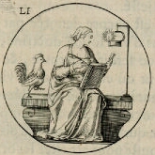The birth and beginnings of Madame d’Aulnoy
Marie-Catherine Le Jumel de Barneville, baronne d’Aulnoy, died in Paris on January 13, 1705 – this has been known for a long time. But when was she born? The traditional answer to this question is “1650 or 1651,” based on a statement in the parish registers of Saint-Sulpice according to which Madame d’Aulnoy died at the age of 54 or thereabouts (“54 ans ou environ”).1 These references to a deceased’s age, usually provided by surviving family members, are notoriously vague and unreliable. Fortunately, other writings have been preserved which reveal that in fact Marie-Catherine was born in the fall of 1652, got married at age 13, and died at 52.
A first clue can be found in the parish registers of Saint-Paterne (near Alençon), which show that the wedding between Nicolas-Claude Le Jumel and Judith-Angélique Le Coutelier – Marie-Catherine’s parents – was celebrated on October 17, 1650, making a birth before the summer of 1651 highly unlikely. The newlyweds then apparently settled in Normandy, where Nicolas-Claude owned the fief of Barneville-la-Bertran (near Honfleur). The register of the parish of Barneville for the years 1650-1687 is in disarray, with many leaves missing or mutilated. But it does include a 6-line entry – added belatedly in the lower and outer margins of the page – recording the baptism, on October 1, 1652, of a daughter born to Nicollas Claude Le Jumel and Judic Angelique Le Coutellier. While some words are lost, the newborn’s name was spared and is fully legible: Marie.
Confirmation that this is indeed the baptismal record of the future Madame d’Aulnoy (and not of a younger sister of hers) is provided by a curious note in the middle of a 15th-century manuscript kept today at the Bibliothèque nationale de France. Digitized in color and posted online on Gallica, this unique inscription had been hiding in plain sight, waiting to be rediscovered. I became aware of it last November, while browsing through the papers of Baron Jérôme Pichon at the Bibliothèque Historique de la Ville de Paris. One of the foremost bibliophiles of his day, Pichon (1812-1896) took a special interest in Madame d’Aulnoy: he owned several very rare editions of her works and collected archival documents about her and her husband. The unpublished dossier includes a transcribed note followed by the cryptic reference “Sup.t fr. 3085/2” – an old shelf mark of the Bibliothèque Nationale’s manuscript division. This corresponds to the current Français 15065, the second volume of a 1469 scribal copy of Arnoul Gréban’s Mystery of the Passion. In the lower and outer margins of folios 66 verso and 67 recto, the book’s owner left a message for posterity:
Marie Catherine Le Jumel de Barneville-La-Bertran, Dame Donoy, Barneville, Pandepie, and other places, wrote this at the age of 13 years and 8 months. Written in Barneville in the present month of July 1666. It has been almost 200 years since this book was made, and whoever will have this Book should know that it was mine and that it belongs to our house. Written in Normandie near Honfleur. Adieu, Reader, if you have my book and I don’t know you and you don’t appreciate what’s inside, I wish you ringworm, scabies, fever, the plague, measles, and a broken neck. May God assist you against my maledictions.
Her math may be off by a month or so, but “13 years and 8 months” in July 1666 points unambiguously to a birth in the fall of 1652. The writer is indeed already “Dame Donoy,” following her marriage to François de la Motte, baron d’Aulnoy, on March 8, 1666. A first daughter was born in January 1667; three more children followed in quick succession, before Marie-Catherine even turned 18.
Barring further discoveries, this marginal inscription appears to be the earliest piece of writing that has come down to us from Madame d’Aulnoy. Proud, feisty, and eloquent, it proclaims the author’s identity and warns the future reader of “her book” not to underrate what’s “inside.” D’Aulnoy’s first publications did not appear until 1690, but her handwriting was already on the wall in Barneville in 1666.
Volker Schröder
March 29, 2019
Footnote
1. Many important documents concerning Madame d’Aulnoy’s life were discovered and discussed by the following scholars: Auguste Jal, Dictionnaire critique de biographie et d’histoire, 2nd ed., Paris: Plon, 1872, p. 1306-1307; Raymond Foulché-Delbosc, introduction to his edition of the Relation du voyage d’Espagne, Paris: Klincksieck, 1926; Jeanne Mazon, “Mme d’Aulnoy n’aurait-elle pas été en Espagne?,” Revue de littérature comparée 7 (1927), p. 724-736.



Pingback: “Dieu t’assiste contre mes malédictions !” Madame d’Aulnoy magicienne | Le siècle des merveilles: Mme d'Aulnoy et Perrault
Bless you with whatever may be the opposite of ringworm and scabies for sharing this marvelous anecdote!